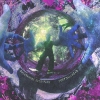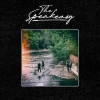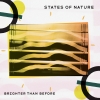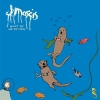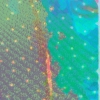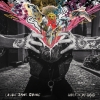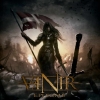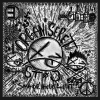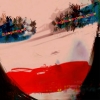Gig Reviews
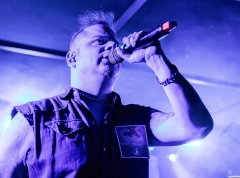
Thy Catafalque
Stengade, Copenhagen, DEN - 6/4
Album Reviews
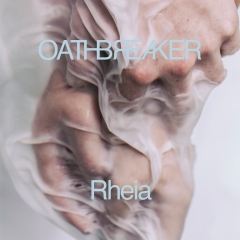
Oathbreaker
Rheia
Written by: AP on 20/12/2016 00:43:21
Until recently, Oathbreaker was one of Belgium’s best kept secrets, but that all changed when the Gent-born outfit issued their second album, “Eros|Anteros”, in 2013 and crept onto everyone’s lips as a leading figure of the worldwide ‘blackgaze’ movement. As with every frontrunner, the band’s forte was carving out a unique niche within the genre, installing themselves as a kind of antithesis to the bright and uplifting disposition that many of their peers have. On this third outing, “Rheia”, they dive even deeper into the black abyss to capture the idea of torment on a cinematic scale. The result is a sweeping and emotionally wrenching, yet altogether cathartic piece of music, which has the capacity to earn Oathbreaker the respect they deserve at last.
Perhaps the best way to describe the sound of “Rheia” is to take the grandeur of Deafheaven and paint it in the faded grayscale tones of the Swedish screamo act Suis La Lune. One might also be tempted into dubbing it ‘black-Björk’ in places — so similar is vocalist Caro Tanghe’s girlish, insidious style of singing to the Icelandic alt-pop artist. The similarities end at tone and technique however, as Tanghe’s lyricism is much darker, despairing even, as she wrestles with inner demons, poeticises the grief of loss, and explores the numbness of indifference. Oathbreaker’s music is not supposed to be inspiriting; it means to project hurt and anguish onto the listener and have them suffer, too. Yet paradoxically, there is something life-affirming about that transference, lending truth to the suggestion that only through suffering can we finally, truly feel alive.
Pessimism thus hangs heavy over the likes of “Being Able to Feel Nothing”, but by pushing the negative sensations into an epic format, it never feels exhausting. On the contrary, the leaps that Oathbreaker has taken to accommodate their vision bring fresh nuances to the band’s sound, particularly so in the vocal department. Tanghe’s voice is more versatile compared to past endeavours, her singing becoming an instrument in its own right, as the wistful moans and debilitating, George Clarke-sque screams melt into cascades of sullen melody, hypnotic low-end rumble and black metallian percussion by guitarist Lennart Bossu, bassist Gilles Demolder and the newly added drummer, Wim Coppers. The symbiosis is perfected on the standout “Needles in Your Skin”, which tiptoes in with shoegazing fragility, before snapping into a rage of earsplitting screams, wintry tremolo and blastbeats, collapsing into lamenting sobs of ”How could you go without me?” down the middle, and ultimately discharging a spectacular lead/solo in the crescendo, leaving a wall of feedback in its wake.
“Immortals” then emerges from the smoke, wary and downtrodden at first, but quickly transforming into an act of defiance as Bossu swaps his ringing notes for a huge, vibrating deluge and Tanghe tears through with her most ferocious growls yet. Once she has sunken into utter hopelessness again in a barren quietus halfway, the song finishes as a trudging post-rock piece, setting the mood for the meditative trilogy of “I’m Sorry, This is”, “Where I Live”, “Where I Leave”. Utilising background chatter, droning and ambience and generally putting the ‘gaze’ in ‘blackgaze’, these more subdued and explorative pieces (including the final track, “Begeerte”) have producer Jack Shirley’s fingerprints all over them — they draw clear parallels to Deafheaven’s “Sunbather” and Whirr’s “Sway” in particular — and are a little harder to immerse yourself in.
Indeed, the structure of the record is such that it arrests the listener in a whirlwind of intense emotion, and then gradually loosens its grip on you to end in a kind of admission, in “Where I Leave”, that nothing will be alright: ”Running through the old fields of dreams until there is nowhere left to run.” Each song thus forms an important aspect of an album designed for uninterrupted listening, even if, when broken down into single parts, the most riveting picks are all found in the first half. Granted, the second half can come off as somewhat sluggardly, but the gentle comedown and ultimately acceptance are effective in terms of conveying the record’s notion of absolution. It makes the album feel complete. Shocking, sedating and haunting all at once, “Rheia” is a guarantee for goosebumps, and represents some of the most essential listening of 2016.
Download: Second Son of R., Being Able to Feel Nothing, Needles in Your Skin, Immortals
For the fans of: Deafheaven, Lantlôs, Liturgy, Suis La Lune
Listen: Facebook
Release date 30.09.2016
Deathwish Inc.
 Twitter
Twitter Facebook
Facebook